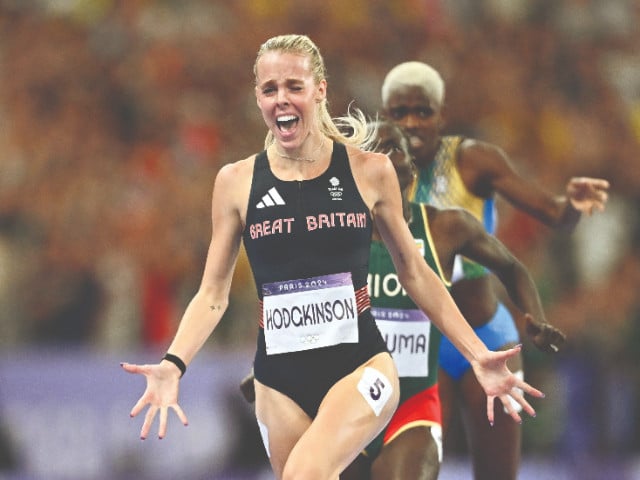LONDON:
World Athletics President Sebastian Coe says his sport enjoyed a stellar 2024 and is on an upward curve in terms of performance and investment, but he also had a word of warning about the latest athlete to carry the mantle of “the new Usain Bolt”.
Coe, who is bidding to become the next President of the International Olympic Committee, returned to his bread and butter to review the athletics year, which of course peaked with 10 days of amazing action on and inside the purple track of the Stade de France in August.
“Paris cemented the sport absolutely at the centre of the Olympic movement in a year of jaw-dropping performances where we had something like 700 personal bests and two or three hundred national records – extraordinary,” Coe told reporters. “If you want a definition of global reach as a sport, then 75 countries had top-eight finishes in Paris where 27 won gold and 43 claimed a medal of some description.
“We had some seven and a half thousand broadcast hours in Paris compared with five and a half in Tokyo and 1,500 in Rio, so on any set of metrics the sport is moving in the right direction. That’s provided us with the momentum and a platform for opening new income streams.”
One of those areas of investment has bypassed World Athletics in the form of Michael Johnson’s new Grand Slam Track series.
The American 200/400 metres multi-medallist and former world record holder-turned pundit will launch his new four-event series in 2025 with a $12.6m prize pot, where 48 contracted track athletes will receive a base salary to compete, along with 48 “challengers” with a $100,000 prize pot up for grabs in each of the combined race events.
The series, which will not include any field events, is seen as something of a challenge to the Diamond League, which is often criticised for its haphazard nature and irregular star head-to-heads, but Coe said he welcomed it.
“I want it to be successful, I want it to add lustre to the direction the sport is going and I take comfort from the fact that kind of investment would not have been around 10 years ago,” he said.
“It’s important we put more funding into the sport, particularly if that makes a seismic difference to the welfare and the financial security of athletes.
“I also think the Diamond League’s in good shape. Its broadcast numbers were higher than ever last year. I think ultimately there’s probably a middle road here with increased funding coming in next year.
“Zurich, Brussels, Oslo, Eugene – these are events that grab global footage but I’m a great believer in market competition and everybody, every year should be sharpening their pencil, including World Athletics.”
‘Sensible realism’
One of the big attractions on the circuit next year, and at the September World Championships in Tokyo, is likely to be 16-year-old sprint sensation Gout Gout.
The teenager ran 20.04 seconds earlier this month to break the 56-year-old Australian 200 metres record and also pipped Bolt’s world under-16 record, a performance the Jamaican great acknowledged by posting “he looks like a young me”.
“He is clearly talented but there is also a need for some sensible realism here as well,” Coe said. “The biggest challenge in coaching is taking a really talented 17 or 18-year-old into the upper echelons of the senior teams.
“I’m not remotely pouring cold water on what is an outstanding talent but the vast majority of people who win world junior titles don’t go on to compete for their national team at senior level.
“But he has a good federation that understands that journey, particularly through the junior into the senior ranks, and the networks around him will be important as this is a rare and precious talent that will need will need nurturing and protecting.” REUTERS







